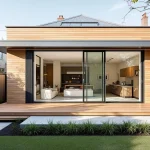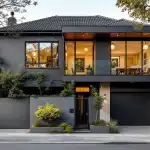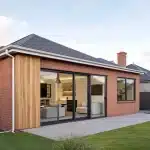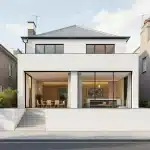How to Plan Home Extensions Melbourne on Any Budget
Planning home extensions Melbourne doesn’t have to break the bank. Smart budgeting and strategic choices can transform your space affordably.
We at Cameron Construction have seen homeowners achieve stunning results across all price ranges. The key lies in understanding costs upfront and making informed decisions about where to invest your money.
Understanding Extension Costs in Melbourne
Melbourne extension costs vary dramatically based on size, complexity, and finishes. Ground floor extensions typically range from $2,400 to $4,500 per square metre, while second-storey additions cost $3,000 to $4,500 per square metre. A simple bedroom addition runs $70,000 to $120,000, kitchen extensions range $150,000 to $300,000, and whole-house extensions can exceed $600,000. These figures reflect 2025 market conditions with Sydney and Melbourne commanding premium rates due to higher labour costs and stricter planning requirements.
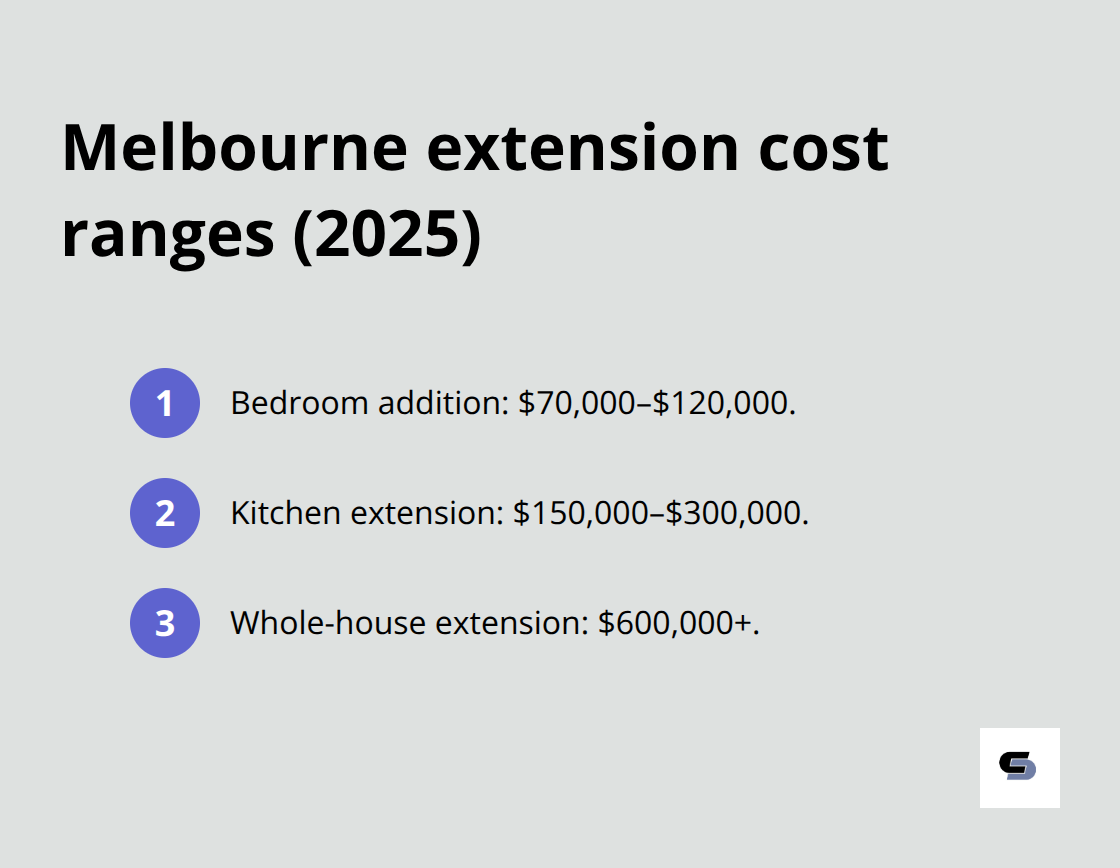
Labour and Material Breakdown
Labour represents 40-50% of total extension costs, with Melbourne tradespeople averaging $45 per hour compared to Sydney’s $40. Materials account for 30-35%, while permits, engineering, and professional fees consume another 15-20%. Foundation work, structural modifications, and roof alterations drive up complexity costs significantly.
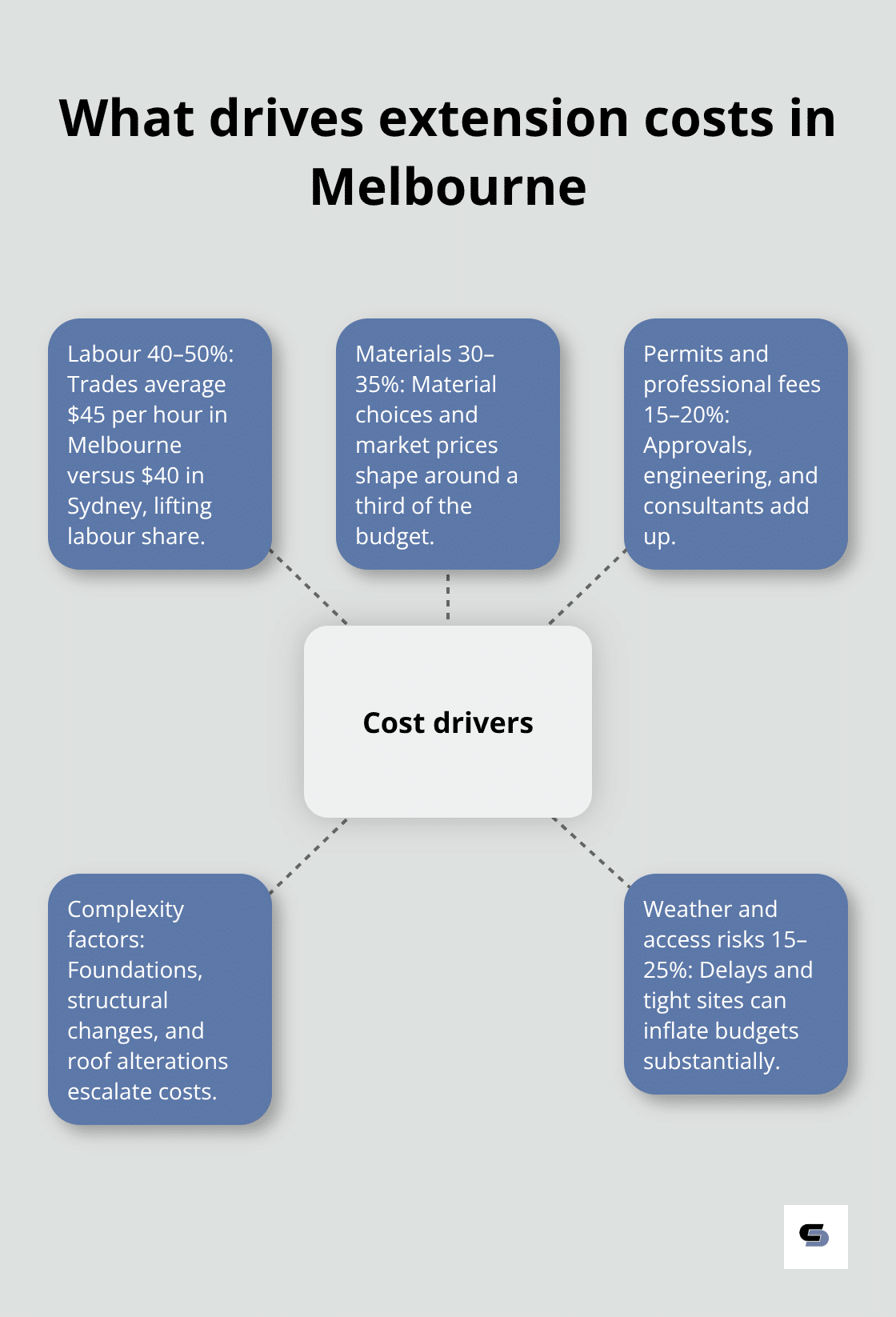
Weather delays and site access issues can inflate budgets by 15-25% (particularly for narrow inner-city properties).
The Hidden Cost Reality
Budget an additional 10-15% for unexpected expenses that surface during construction. Electrical upgrades, asbestos removal in pre-1980s homes, and plumbing relocations frequently catch homeowners off-guard. Council fees, waste removal, and temporary accommodation costs add $5,000-$15,000 to most projects. Building insurance adjustments and utility reconnections create further expense.
Smart Quote Evaluation
Homeowners secure detailed quotes that cover excavation, demolition, and all professional fees before they sign contracts. Quality builders provide transparent breakdowns that separate structural work from finishes (this prevents nasty surprises later). Professional contractors itemise every component from site preparation to final cleanup.
With these cost realities in mind, smart homeowners can now explore proven strategies to maximise their extension budget without compromising quality.
Budget-Friendly Extension Strategies
Strategic design choices deliver maximum impact while controlling costs. Open-plan layouts eliminate expensive internal walls and create spacious feelings in smaller extensions. Rectangular or square footprints cost 20-30% less than complex shapes with multiple corners and angles. Single-storey extensions avoid expensive structural work that second levels require. Extensions positioned on rear properties reduce council scrutiny and speed approvals. Standard ceiling heights of 2.7 metres cost significantly less than cathedral or raked ceilings that require custom engineering.
Smart Material and Finish Decisions
Concrete slab foundations cost $150-200 per square metre versus $300-400 for suspended timber floors. Colorbond roofing runs $53-97 per square metre compared to $200-300 for tiles. Laminate floors at $30-60 per square metre provide durability at half the cost of engineered timber. Standard-sized windows and doors from major suppliers like Stegbar reduce costs by 40% compared to custom options. Professional painters charge $35-50 per square metre for quality finishes that outlast DIY attempts.
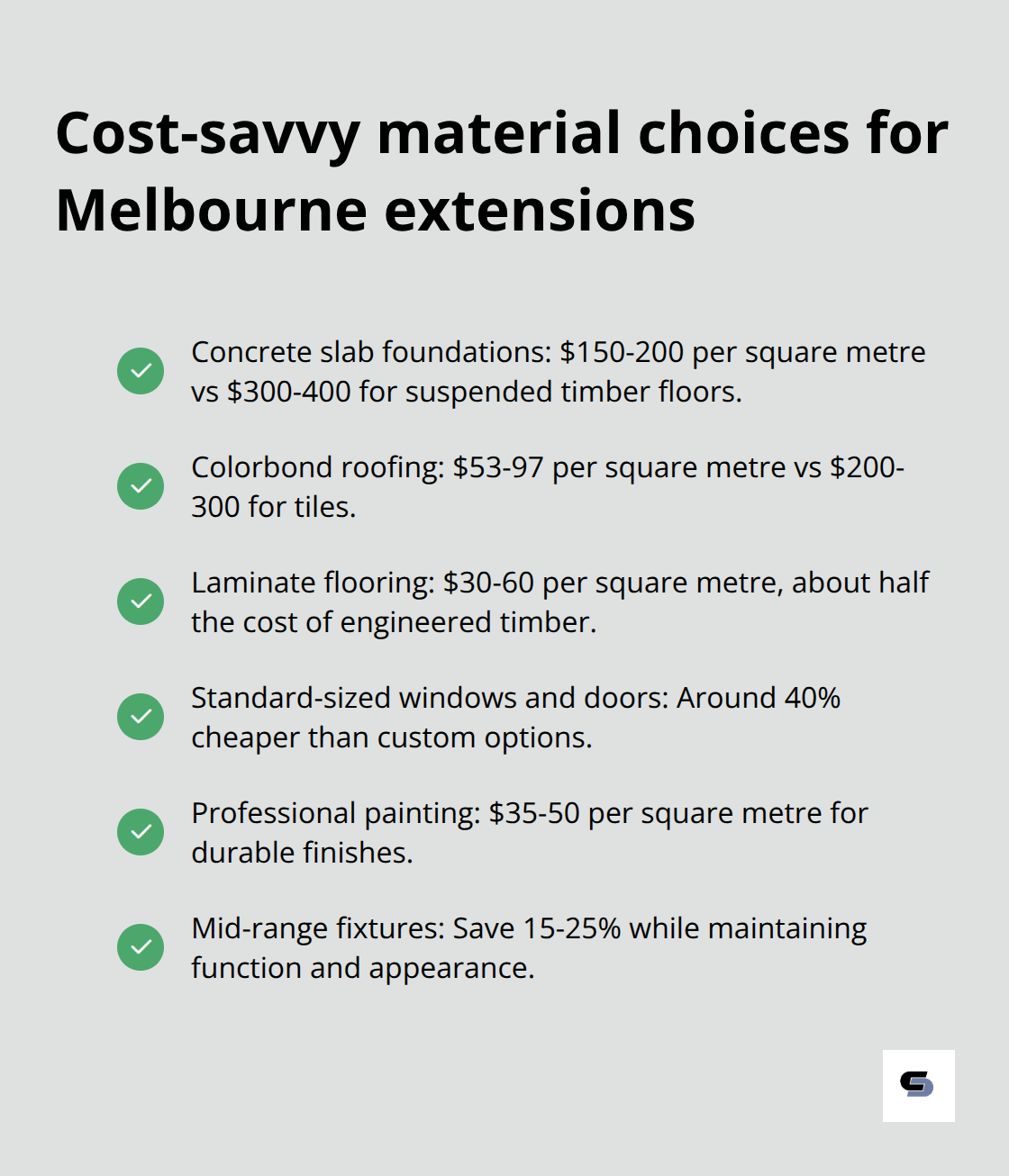
Melbourne homeowners save 15-25% when they select mid-range fixtures over premium brands while they maintain functionality and appearance.
Professional Work Pays Off
DIY electrical and plumbing work requires expensive rectification when inspectors find non-compliant installations. Licensed electricians complete rewiring in 2-3 days versus weeks for inexperienced homeowners. Professional tilers finish bathrooms without costly water damage risks that amateur work creates.
Timing Your Project for Maximum Savings
Projects that start in March or August avoid peak summer and spring pricing when contractors charge premium rates. Homeowners who book trades 3-4 months ahead secure better rates than last-minute arrangements.
These cost-control strategies work best when paired with proper planning and design considerations that comply with Melbourne’s specific requirements.
Planning and Design Considerations
Melbourne council approval determines project success more than homeowners realise. Development Applications take 4-12 weeks for approval, while Complying Development Certificates process in 10 business days but limit design flexibility. Properties within heritage overlays face stricter scrutiny and require detailed heritage impact statements that cost $2,000-$5,000 extra. The Melbourne Planning Scheme mandates setbacks from boundaries for residential development. Site coverage requirements limit building area as a percentage of total site area in residential zones, which forces homeowners to prioritise which rooms matter most.
Council Permits and Approval Requirements
Heritage overlay properties require specialised documentation that adds 6-8 weeks to approval timelines. Council officers assess neighbour impact statements for extensions exceeding 3.6 metres in height or within 3 metres of side boundaries. Planning permits cost $1,500-$3,500 depending on project complexity, while building permits add another $800-$2,000. Site surveys and soil tests become mandatory for extensions over 50 square metres (these reports cost $1,200-$2,500 combined).
Space Planning for Maximum Impact
Open-plan designs create visual flow that makes 40-square-metre extensions feel like 60 square metres. North-facing windows capture natural light for 6-8 hours daily, which reduces electricity costs by $400-600 annually. Vaulted ceilings add 30% perceived volume without increasing floor area, though they cost $8,000-$12,000 more than standard 2.7-metre heights. Built-in storage solutions like floor-to-ceiling wardrobes provide 40% more capacity than freestanding furniture while they maintain clean lines.
Material Selection That Controls Costs
Engineered stone benchtops at $400-600 per linear metre deliver durability comparable to natural stone that costs $800-1,200. Double-glazed windows reduce heating costs by 15-20% annually while they cost only $200-300 more per unit than single glazing. Hybrid timber floors withstand moisture better than solid timber and cost $65-85 per square metre versus $120-180 for premium hardwood. Brick veneer walls provide thermal mass at $180-220 per square metre compared to $280-350 for solid brick construction.
Final Thoughts
Home extensions Melbourne projects succeed when homeowners balance ambition with financial reality. Smart property owners who understand the $2,400-$4,500 per square metre cost range make informed decisions that maximise value. The 10-15% contingency buffer protects against unexpected expenses like electrical upgrades or asbestos removal that frequently surface during construction.
Professional guidance transforms extension dreams into achievable projects. We at Cameron Construction deliver quality craftsmanship that increases property value while we stay on budget (our expert team creates detailed quotes that prevent costly surprises). Our designers and engineers provide transparent communication and tailored solutions that align with your vision and lifestyle needs.
Professional oversight eliminates the stress of multiple trade management while we maintain high standards of compliance and craftsmanship. Cameron Construction provides the expertise Melbourne homeowners need to navigate council approvals and execute quality extensions. The investment in professional guidance pays dividends through proper planning and quality execution that adds lasting value to your Melbourne home.


